#and technically i do have a rin. she's the first heroine i bought actually. she's just in shipping purgatory rn and has been 4 4 months
Text
"i don't have a favorite fate heroine" says local man whose mfc profile being plastered in saber images is definitely 100% a coincidence, has 3 different saber figures (as opposed to 1 of sakura and none of rin), favorite f/sn adaptation is deen/stay night, skipped over rin and sakura's emiya gohan routes to focus on saber and lancer's, and is famously weak to knight girls.
#'i don't have a fave fate heroine' is a lie. i just feel like i don't bc the gold standard for having a fave are the power scaling obsessed#anime-onlies who get aggressive about how rin is better bc she is a tsundere w nice thighs (and there's def 100% nothing else of note to#her character or the ubw route as a whole bc that would mean reading the vn and why would you do that when ufotable's version have fights#that are well-animated and that's all that matters!) getting insanely aggressive abt her whenever one of the other girls or routes are even#vaguely mentioned!#also pointing out how many more saber figures i have is kinda misleading bc if we count general merch i have equal amounts of sakura#(bc of the. 2 of her incident) and while all 3 sakuras i only bought bc they came w something else i wanted. same w 2/3 sabers.#i bought a box set of trading figs mainly 4 cu + gil which the sakura figure + one of the sabers were also in. saber 2 was bc she was#half of a pair w a shirou (who we all know my stance on) + the third saber i got on her own just bc i wanted the full emiya gohan set of 4#and technically i do have a rin. she's the first heroine i bought actually. she's just in shipping purgatory rn and has been 4 4 months#romeo.txt
6 notes
·
View notes
Text
World Book Challenge: China
Officially, the People's Republic of China (PRC). It is the world's most populous country, with a population of around 1.4 billion. It covers approximately 9.6 million square kilometers, and is officially divided into 23 provinces, five autonomous regions, four direct-controlled municipalities (Beijing, Tianjin, Shanghai, and Chongqing), and the special administrative regions of Hong Kong and Macau.
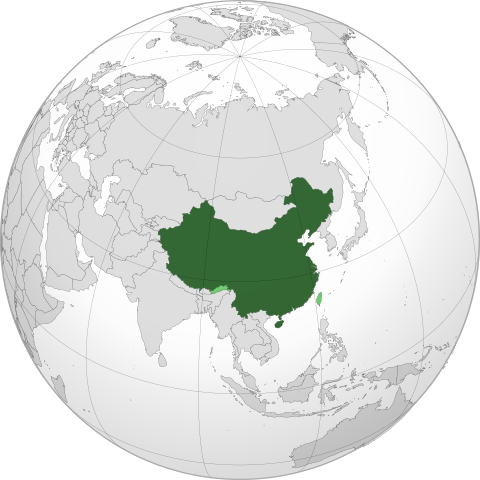
The areas in dark green are under direct Chinese control; the areas in light green (Tibet and Taiwan) are contested. For the purposes of this challenge, I’m treating China, Tibet and Taiwan as three separate countries. Because I can.
Number of Chinese people in New Zealand: As of the 2013 Census, there were 163,104 people of “Chinese (not further defined)” ethnicity in New Zealand - 10,008 of those were in Wellington City.
Have I been there? Yes! I visited Shanghai with my Dad in December 2011. I bought a really nice coat, had tea that tasted like warm Fanta (it was oddly addictive), and got hugged by Dave Grohl. So, the usual Chinese experiences, really.
I also had Peking Duck for the first time in my life, and holy hell I didn’t know what I was missing. I’ve tried to make up for it by eating copious amounts of it since.
The books
For “China” on my reading challenge, I read three fantasy novels - Grandmaster of Demonic Cultivation, by Mo Xiang Tong Xiu, and the final two books of the Poppy War trilogy (The Dragon Republic and The Burning God) by R. F. Kuang, a Chinese-American author.
Grandmaster of Demonic Cultivation (魔道祖师 / Mó Dào Zǔ Shī)
(Book 30 of 2021)
Given the fact that I have an entire subsection of my blog about how much I love the live-action TV show based on this book, it probably shouldn’t be a surprise that I had Mó Dào Zǔ Shī at the top of my list of Chinese books to read.
Mó Dào Zǔ Shī tells the story of Wei Wuxian, a loathed cultivator of dark and demonic arts who resurrects 16 years after his tragic death. His return to the world brings him to reunite with the people in his first life, including his soulmate, the honored Lan Wangji (who mourned him for 16 years, during which he branded himself with the same mark as Wei Wuxian and kept his memory alive and I’m okay, I promise). Wei Wuxian then begins to remember his time before his demise 16 years ago, from his beginnings as a young cultivator to his descent to dark magic. Together, they solve a mystery linked to a dark tragedy from Wei Wuxian’s first life, then live happily ever after.
This novel was originally published on the Chinese web novel site JJWXC from October 31, 2015 - March 1, 2016, with additional side stories that continue to be released sporadically. The revised version of the main story was later published online until September 7, 2016. A paperback version was released on December 12, 2016, with a total of four volumes in traditional Chinese. The first of three planned volumes in simplified Chinese, titled Wuji, was released in 2018, but release of the following installments has stalled after the locking of the novel on JJWXC since January 2019.
Mó Dào Zǔ Shī isn’t officially available in English, and given that it depicts an explicit danmei relationship between Wei Wuxian and Lan Wangji, I don’t think we’ll ever see an official version. Though there are official translations into Korean, Thai, Vietnamese, Russian, Japanese, and Burmese, and the tour for the TV traveled to Toronto, Los Angeles and New York, so maybe one day there will be an official translation.
For now though, you can read the entire novel for free at Exiled Rebels Scanlations, where it has been translated in full by a then-highschooler called “K-san”. It’s hard to actually judge the merits of the writing of the original novel, given I was reading an unofficial translation, but that was actually half of the sweetness of it. It was kinda rough - K-san tweaked the terms they used as they gained more confidence with the translation, and I enjoyed reading the translator and editor notes that accompanied most chapters - especially notes such as “we’re translating as fast as we can, stop asking for faster updates!”. It felt really organic and friendly, and the story is good (though much gorier than the TV show and good god boys, learn what lube is, it’ll make your lives better I promise).
I read the book more as a companion to the TV show though, rather than a novel on it’s own merits, so I’m not sure I can judge it as a novel on it’s own merits. Though the book did teach me one very important piece of information: Lan Wangji canonically smells of sandalwood.
Would I read it again? If an official English translation comes out, I’d probably read that. I’m more likely to watch the TV show again, or dive into one of the sesquillion Untamed fanfics on AO3 ( Lán Zhàn | Lán Wàngjī/Wèi Yīng | Wèi Wúxiàn was the most popular ship on AO3 in 2020, with 12,878 new works about these characters being published that year).
The Dragon Republic and The Burning God
(Books 34 and 35 of 2021)
I read The Poppy War and The Dragon Republic back in September 2019 (when I wasn’t counting how many books I was reading, but I did have a record of them), and I decided to re-read The Dragon Republic because I couldn’t exactly remember where the story was up to.
And it’s a good thing I did, as something I thought happened at the end of The Dragon Republic actually happened at the end of The Poppy War, so oops?
The Poppy War trilogy is a grimdark fantasy novel set in fantasy China, with a Chinese protagonist and written by a Chinese-American author. It’s spectacular. The trilogy draws its plot and politics from mid-20th-century China, though it’s atmosphere is more inspired by the Song dynasty. The conflict in the first book is based on the Second Sino-Japanese War (though this time, it’s the Chinese empire against the Japanese empire), in the second on the start of the Chinese civil war (Chinese empire against nascent Republican movement), and in the third on the end of Chinese civil war (Republicans versus not-Republicans).
It’s a massive trilogy. It’s incredibly complex, with a huge scale and massive numbers of characters, though the fact it’s all seen through Rin’s eyes (with the occasional first and last chapter from the point of view of other characters) helps.
The story follows that of Fang Runin, better known as Rin, a poor war orphan in southern Nikara who trains in secret to test into the elite Sinegard Academy. Throughout the trilogy she deals with racism, sexism, elitism...most of the isms, really. Author R.F. Kuang said that Rin's life is meant to parallel the trajectory of Mao Zedong, and I had fun trying to match events in Chinese history to the events in the book (the easiest ones to spot are the Rape of Nanjing, the nuclear bombing of Japan and the Long March).
I don’t remember Mao Zedong having the power to call on a fire god, however. It’s probably a good thing that’s not something that happened in real life China, as Mao’s policies killed enough people without him literally being able to spit fire.
I described the first book as “If Kvothe from The Name of the Wind was female, Chinese, and allowed to say fuck.” Those two books felt really similar to me - they’re very much your “outsider is accepted to elite academy, winds up pissing off most of their classmates and chooses an obscure major to specialise in before being thrown into a conflict they are key to winning.” But honestly, I preferred the Poppy War trilogy, even if the final book did get super dark.
Rin is a really refreshing character, and the world seen through her eyes is a very different place to one I’m used to reading about. Kuang said that she "chose to write a fantasy reinterpretation of China's twentieth century, because that was the kind of story I wasn't finding on bookshelves", and I’m so glad she did. The world needs more books like this. I’m as pasty and as white as they come, and I loved reading a book where the heroine was authentically Chinese. This isn’t a pakeha author trying to fit themselves into someone else’s shoes - this is someone with a deep understanding of Chinese military history and collective trauma using that understanding and pain to build a new fantasy world.
I loved it, and if you can stomach war scenes, I recommend this trilogy.
Will I read the Poppy War trilogy again? I might do. It’s a bit darker and more desperate than I usually read - particularly The Burning God - but I did enjoy them. So that’s a firm “never say never”.
Bonus book!
These Violent Delights
I read NZ-Chinese author Chloe Gong’s These Violent Delights earlier this year (book number 20 of 2021), before I set myself this challenge, so it doesn’t technically count as an entry for “China” in my book challenge. But it is amazing, and I love it, so I wanted to give it a quick shout out here (because if we’re talking fantasy reimaginings of Chinese 20th century history by Chinese diaspora authors...).
These Violent Delights relocates the story of Romeo and Juliet to 1920s Shanghai, casting the two leads as the heirs to rival gangs. It’s brilliant, it’s beautiful, there were sentences that made me stop and gasp for the sheer delight of having read them, and there’s a monster made of bugs driving the citizens of Shanghai insane. The way Gong has woven the characters from the play into their 1920s counterparts is delightful (I say this as someone who’s never actually read the play, though I think I saw the Leonardo DiCaprio movie because it was difficult to be a tween in the late 90s and not be exposed to his films).
15/10, would definitely read it again, it’s been on the New York Times bestseller list for weeks for a very, very good reason. Stop reading this blog and go get a copy. Now.
The feast
I admit, using China as my first country may have been a bit of a cop out, given my familiarity with Chinese food - though, living in a Western country, I’ve probably eaten more Westernised Chinese food than authentic Chinese food.
Which is why I was chuffed to learn that spring rolls are, actually, authentic Chinese food. I always thought they were a Westernisation, like sweet and sour pork or fortune cookies.
For my Chinese feast, I turned to The Woks of Life, a delightful Chinese cooking blog that I can’t open without being inspired to cook like 9 million things.
When I started this project, I originally was only going to cook one dish from each country. I figured I’d go easy on myself for China, and make 花生酥 (hua sheng su), a traditional sesame peanut brittle.
It’s something I’ve made before - I make little bags of it for my colleagues each lunar new year.
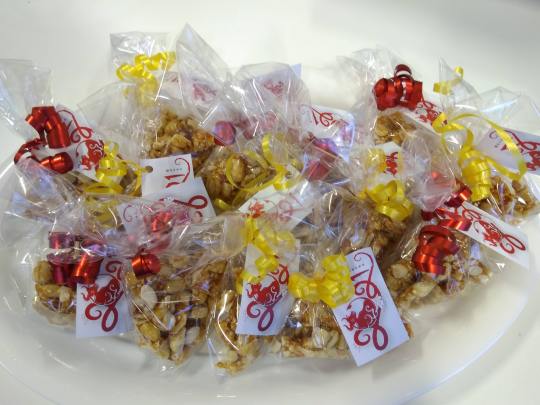
I don’t follow the Woks of Life recipe exactly - for example, I’ve never once roasted and shelled my own peanuts. I tend to use a mix of blanched and pre-roasted peanuts in my 花生酥, and I think it comes out okay. Next time I’m going to increase the amount of sugar I use - I find that 270g of rock sugar is not quite enough to cover the peanuts totally. Which is a pain. Next time I think I’ll use 300g, and turn the heating on in my kitchen so it’s warmer, to stop the brittle from hardening before I can properly get it into the tray to cool.
But then I changed my mind, and decided to throw a full on feast.
For the feast I threw, I made two more dishes from the Woks of Life - Easy Peking Duck with Mandarin Pancakes, and 年糕 (nian gao), or stir-fried rice cakes (though I did them with chicken, not pork, as that’s what I had in my freezer). I also cooked up some spring rolls, as I had them leftover in my freezer from my housewarming (for which I over catered, because I cannot do anything but over cater any event I throw). I should have marinated the duck longer. That one was on me.
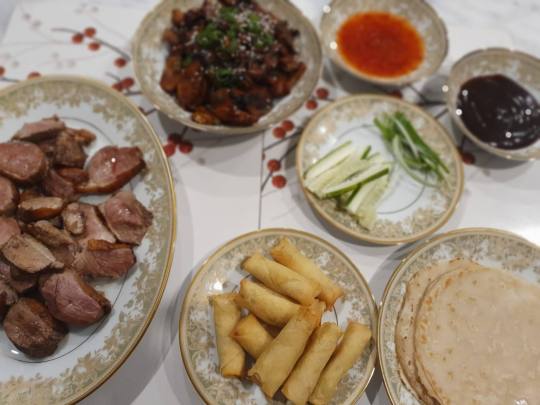
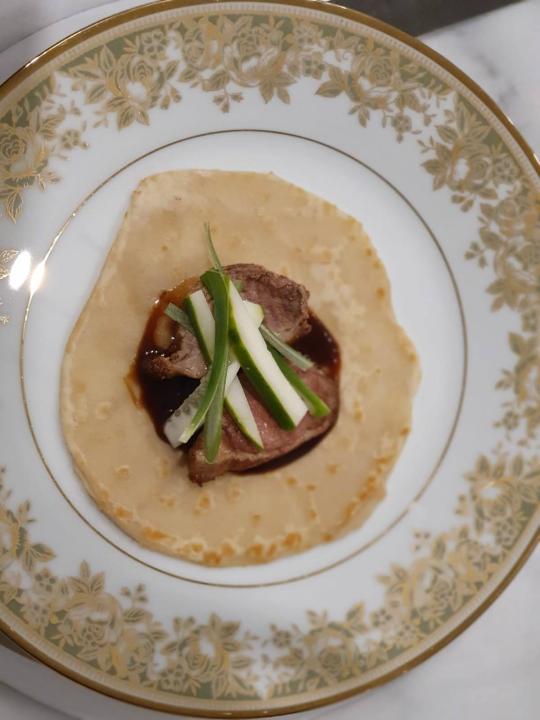
I also made some 核桃酥 (he tao su), walnut cookies, which were delicious and I definitely want to make again. I think I’ll add some hazelnuts in as well for additional crunch, and make them slightly smaller - they were 12 very big cookies.
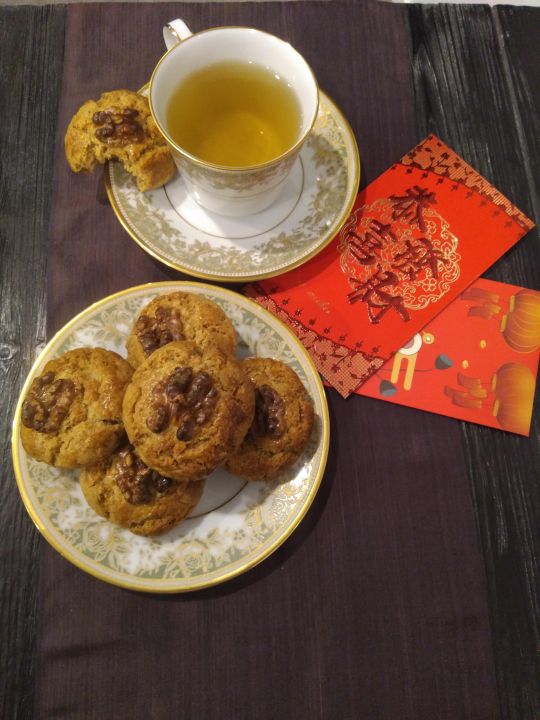
But delicious cookies.
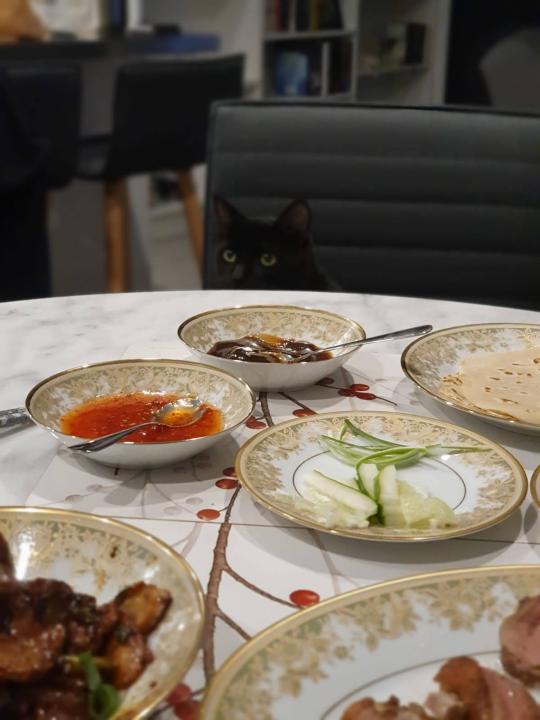
Kisu was most distressed that we did not feed her anything from this feast.
The Playlist
I ended up finding this “Chinese Indie & Rock” playlist on Spotify, which I really enjoyed. I could understand none of the songs, but I enjoyed the heck out of a lot of them. I’ll probably keep listening to this playlist - they were definitely my sort of jams.
#China#PRC#Grandmaster of Demonic Cultivation#mo dao zu shi#mo xiang tong xiu#the poppy war#the dragon republic#the burning god#r. f. kuang#book review#world book challenge#rf kuang#these violent delights#chloe gong#the woks of life#hua sheng su#sesame peanut brittle#he tao su#chinese walnut cookies#walnut cookies#nain gao#stir fried rice cakes#peking duck
8 notes
·
View notes